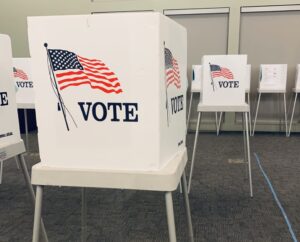
The National Interest Foundation Newsletter
Issue 250, August 30, 2024
Welcome to our NIF Newsletter. In this week’s edition, we examine Hezbollah’s retaliation to Israel’s assassination of its senior commander and the latest concern over the potential of an all-out war, look into how the arrest of Telegram CEO Pavel Durov has sparked a debate regarding freedom of speech, and provide analysis about the possible impact of the Gaza War on upcoming U.S. elections in November.
Editor: Bassam Tarbush
Hezbollah’s Retaliation to Israel’s Assassination of Its Senior Commander and the Latest Concern Over the Potential of an All-Out War

The risk of further escalations between Israel and Hezbollah will persist so long as there is no cessation to the hostilities in Gaza. (Photo from Reuters)
Hezbollah’s Retaliation to Israel’s Assassination of Its Senior Commander and the Latest Concern Over the Potential of an All-Out War
The long-expected retaliation by Hezbollah to Israel’s targeted assassination of its senior commander Fuad Shukr back in late July took place this past weekend with the firing of more than 300 rockets at Israeli military bases and barracks, as Israel also struck more than 30 southern Lebanese towns and villages in its largest attack since October. Understandably, this back-and-forth exchange yet again evoked concern regarding the potential of deterioration into an all-out war. Thus, while there was relief that the latest hostilities did not escalate any further, the prolonging of the destructive Gaza War means that the conditions still exist for circumstances to expand and spiral out of control into a larger-scale regional conflict. Ultimately, without a halt to the atrocities in Gaza, the delicate situation along the Israel-Lebanon border remains one where any sudden miscalculation risks exacerbating and dragging in others such as the United States and Iran.
Hezbollah’s retaliation came several weeks after Israel’s assassination of Shukr, as well as that of Hamas political leader Ismail Haniyeh in Tehran. Both of these targeted Israeli killings were denounced by peace advocates as bellicose actions deliberately seeking to thrust the region into full-blown conflict. They were also in line with the prevailing belief held by many fair-minded observers that Israeli Prime Minister Benjamin Netanyahu and other officials have been derailing mediated efforts of reaching a ceasefire agreement in Gaza, as on the contrary, the continuation of hostilities there serves their political interests. Rather than quell tensions, Israeli officials would have calculated to trigger additional escalations with the targeted assassinations, thus allowing for the prolonging of military operations in Gaza. It is suspected that Hezbollah may have delayed their retaliation for a couple of reasons related to this: partly to allow the Gaza ceasefire talks to proceed and also potentially due to the presence of U.S. warships in the region and a concern that Israel was intentionally aiming to provoke the involvement of the United States. Nevertheless, as the preceding months have gone by, it has become evident that the initiation of a ceasefire in Gaza is essential to putting an end to hostilities in the region. This is clear with regards to the situation along the Israel-Lebanon border, which has been fueled by outrage at the calamitous Gaza War.
Some analysts have speculated that Hezbollah’s timing for its retaliation this past Sunday may have purposely come shortly before Gaza ceasefire talks in Cairo were slated to take place as a means of compelling the United States to ramp up its pressure on Israel regarding reaching an agreement. All of this comes at a time when Netanyahu and Israeli officials have been adding new conditions for a potential deal, making the achievement of one increasingly challenging. There is also concern that Netanyahu – as was the case with the two recent targeted assassinations – could again try to stoke a regional escalation that would drag in the United States and Iran, a strategy that is becoming more apparent. As experts have pointed out, the assassinations were not the first such attempt. Back in April, Israel carried out a belligerent airstrike on the Iranian consulate in Damascus, an incident which many including U.S. President Joe Biden viewed as an effort to provoke a war involving the United States and Iran.
The root cause of the current hostilities between Israel and Hezbollah is the longstanding conflict in Gaza. Without a Gaza ceasefire deal, the prospect of further escalations along the Israel-Lebanon border will remain, even if the latest occurrence this past week appears to have been curbed for now.
The Arrest of Telegram CEO Pavel Durov Sparks a Debate Regarding Freedom of Speech

Durov was arrested in France this past Saturday at Paris-Le Bourget Airport. (Photo from Getty Images)
The Arrest of Telegram CEO Pavel Durov Sparks a Debate Regarding Freedom of Speech
The recent arrest of Pavel Durov, co-founder and CEO of the Telegram messaging app, in France has drawn concern regarding digital freedom of speech and the amount of responsibility that social media companies should bear for the content on their platforms. Some observers have criticized what they deem to be clear governmental overreach and a violation against human rights of speech and association. They have warned that the incident could set a precedent for charges against other social media executives. Durov’s arrest has also elicited backlash due to an uneasiness that it might embolden governments to prosecute individuals tied to tech companies for failing to turn over user data and prompt platforms to excessively moderate content for fear of being criminally charged. French authorities have expressed that the arrest was connected to a broader investigation into an unnamed person and focused on criminal activity on Telegram. The company itself released a statement after Durov’s arrest asserting that it abides by European Union (EU) laws and that its content moderation is aligned with industry standards and constantly improving.
Durov was detained at Paris-Le Bourget Airport shortly after landing there last Saturday, as French authorities decided to initiate the move and in doing so, accuse him of complicity in a range of criminal acts. Following his arrest, French prosecutors released a list of charges against the aforementioned “unnamed person” that is the subject of the criminal investigation for which Durov is allegedly being questioned about. These charges include possession of child pornography, money laundering, and association with organized crime. Durov has long labeled himself as a champion of unconstrained freedom of speech online, with his Telegram platform utilizing a lighter approach to content moderation than many other companies. Several months ago, he had even commented that some governments were seeking to pressure him, but that the app should remain a neutral platform and not a “player in geopolitics.” Analysts have pointed out that for a handful of years, it appears as though the European Union in particular – which has some of the strictest content policies in the world – has sought to try and constrain Telegram into cooperation with its rules. Back in 2022 for example, the EU adopted the Digital Services Act, compelling the platform to comply with its transparency and moderation standards – which included taking proactive measures to police illegal and harmful content.
One of the main elements of Durov’s arrest that is especially troubling is the potential geopolitical implications that it could have. For a while now, Europe has been preoccupied with approaches related to the regulating of social media platforms, often aiming to walk a fine line between allowing for freedom of expression and policing certain content. Thus, some experts have highlighted that it represents a slippery slope which may open the door for further clampdowns on freedom of speech and expression. They have outlined that it also has the potential to create misconceptions about encryption and ultimately hurt activists and dissidents around the world who rely on the data security method for their safety. As one researcher who studies cryptography aptly mentioned, “I do worry about this sort of perception of encrypted applications as being a place that enables these kinds of crimes to be committed,” since it can happen on non-encrypted platforms as well.
In the end, arresting a tech company executive for content shared on their platform sets a dangerous precedent which could have wide-ranging consequences, and is a rare but troubling move by legal authorities to try to hold them personally liable for the behavior of users on a major social media platform. One commentator tried to put the problematic nature of the move in perspective, drawing a parallel to how people would be up in arms if, for example, a car company was considered responsible or liable for the actions of a drunk driver. Often times, what works in the favor of tech company executives being accused of liability is the difficulty that prosecutors and law enforcement agencies have in proving that an individual had knowledge of illegal activity on one of their platforms and failed to take action. It remains to be seen if this will again be the case for Durov, who was issued preliminary charges in France on Wednesday and barred from leaving the country as the investigation continues.
The Possible Impact of the Gaza War on Upcoming U.S. Elections in November

Citizens who are not satisfied about the handling of the Gaza War may choose to stay at home in November. (Photo from AP)
The Possible Impact of the Gaza War on Upcoming U.S. Elections in November
Following the completion of this year’s Republican National Convention (RNC) in mid-July and Democratic National Convention (DNC) late last week, both major party tickets have now been cemented, as we approach the two-month marker before Election Day in the United States. The upcoming November 5th election will of course include the 2024 U.S. presidential race, in addition to other important federal, state, and local ones as well. Since it is a presidential election year, any voter shifts at this top level will have more repercussions in an array of non-presidential races than in off years. Analysts are expecting a tight race in the impending presidential election between sitting Vice President Kamala Harris and former President Donald Trump, and as a result, there are several key factors which could end up playing a determinant role in its outcome and consequently that of some other anticipated close down-ballot races for U.S. Congress, governorships, and state legislatures.
One of these notable aspects is voter perception regarding the handling of the Gaza War – something that might prove to be particularly momentous in battleground states where the margin of victory is likely to be very small and yet impactful to the overall end result. Throughout the past nearly eleven months since the onset of the Gaza War, we have seen opposition to it and concern with the handling of the conflict manifest itself into a large-scale anti-war movement. This has also prompted a considerable number of ‘uncommitted’ protest votes across the country, including in pivotal swing states like Michigan and Wisconsin, with these members of the electorate having the potential to sway race outcomes in either direction. A drop-off in turnout for any electoral candidate may very well have a weighty effect, and many races will likely come down to whether or not this outweighs those who end up casting their votes regardless.
In critical battleground states such as the aforementioned two, Pennsylvania, and others, seemingly minor changes in voter turnout or voting preferences could ultimately have a gigantic impact. This is due to a couple of reasons. Firstly, the margin of victory in these states – as they were in recent presidential election years – is certain to again be extremely small and thus susceptible to any type of electoral shift. In Michigan for example, former President Trump’s win total back in 2016 was less than 11,000 votes, while President Biden carried the state in 2020 by less than 155,000 votes. Additionally, in Wisconsin, Trump won the state by less than 23,000 votes in 2016, and Biden by less than 21,000 votes in 2020.
Secondly, the issue of the Gaza War specifically has proved itself to be salient in these states as well. During the 2024 presidential primary process, more than 100,000 ‘uncommitted’ protest votes were cast in Michigan, and nearly 50,000 in neighboring Wisconsin. Therefore, in the various upcoming November general elections in these states and others like Georgia, Arizona, North Carolina, and Nevada, the outcomes may be determined by how many of these same primary voters cast ballots for an independent candidate or abstain from voting altogether. In the last U.S. presidential election, Biden won six swing states by narrow margins – three of these by less than 21,000 votes. With Biden having of course dropped out of the 2024 race, Democratic nominee Harris will have to try and garner the support of those who felt dissatisfied with his Gaza War policy or risk losing tight states that were essential to the Biden-Harris triumph back in 2020.
When analyzing the potential impact of a subject like the Gaza War on U.S. elections in November, it is also necessary to juxtapose the significance of foreign policy considerations such as this with domestic-related ones. While it is undoubtedly a vital area of concern for enough voters to have a determining effect on some electoral outcomes, at the same time, for others, it might not be the principal factor in influencing their voting decision. Ordinarily, surveys show that domestic policies hold more weight than foreign policy issues for many American voters. Recent polls for this electoral cycle conducted by reputable sources like Pew Research Center and Gallup have found that inflation, housing, health care, and immigration are the top high-priority issues for voters, with foreign policy sitting a bit below in the list at around number ten. However, even if domestic issues are of the most relevance to a majority of the American electorate; in totality, the Gaza War does have the potential to play a determinant role on the overall outcome of a host of 2024 elections due to the sheer narrow margins expected.
